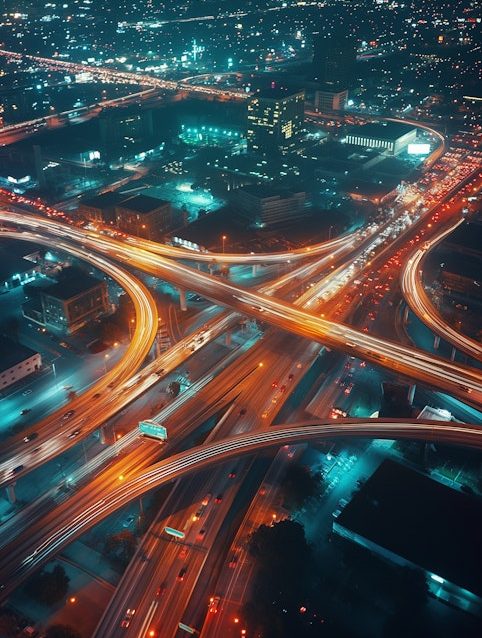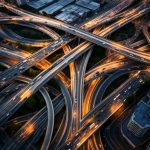Sustainable Development
Transportation is the backbone of any economy, and Nigeria’s transportation systems are in dire need of modernization to meet the demands of its growing population. Building modern transportation systems is not just about infrastructure; it’s about ensuring that these systems are sustainable, efficient, and equitable.
The Current State of Transportation in Nigeria
Nigeria’s transportation sector faces significant challenges, including:
- Traffic Congestion: Major cities like Lagos suffer from severe traffic jams, leading to lost productivity.
- Outdated Infrastructure: Many roads, railways, and airports are outdated and poorly maintained.
Transportation is a vital pillar of economic development, connecting people, goods, and services across regions. In Nigeria, a country with a population exceeding 200 million, the demands on transportation infrastructure have grown exponentially. However, existing systems remain inadequate, plagued by poor infrastructure, inefficient networks, and environmental challenges. To ensure sustainable growth and socio-economic development, Nigeria must modernize its transportation systems, integrating smart technologies and environmentally friendly solutions.
This article explores how Nigeria can build modern transportation systems that are efficient, sustainable, and inclusive. It delves into the challenges, opportunities, and strategies for achieving a robust transportation network, with a particular focus on leveraging technology and smart infrastructure.
The Current State of Transportation in Nigeria
Nigeria’s transportation sector is currently characterized by significant inefficiencies and underdevelopment. The challenges include:
- Traffic Congestion:
- Cities like Lagos, Abuja, and Port Harcourt face severe traffic congestion, leading to hours of lost productivity and increased fuel consumption.
- Urban roads are often overburdened, with poorly maintained traffic management systems.
- Outdated Infrastructure:
- Many roads, railways, and airports are in poor condition due to inadequate maintenance and underinvestment.
- Rural areas lack proper road networks, isolating communities and hindering economic activities.
- Environmental Impact:
- The heavy reliance on fossil-fueled vehicles contributes significantly to air pollution and greenhouse gas emissions.
- Public transportation systems, such as buses and taxis, are often inefficient and environmentally unsustainable.
- Inefficiency in Public Transport:
- Public transportation systems are often overcrowded, unreliable, and unsafe.
- There is limited integration between different modes of transport, such as buses, trains, and waterways.
The Need for Modern Transportation Systems
Modern transportation systems are crucial for addressing these challenges and fostering sustainable growth. Such systems offer several benefits:
- Economic Growth: Improved transportation facilitates trade, enhances productivity, and attracts investments.
- Social Inclusion: Affordable and reliable public transport ensures access to education, healthcare, and job opportunities for all.
- Environmental Sustainability: Green transportation systems reduce carbon footprints and promote sustainable urban development.
- Efficient Mobility: Modern systems ensure the seamless movement of people and goods, reducing delays and enhancing efficiency.
Smart Transport and Infrastructure: The Future of Mobility in Nigeria
Smart transportation involves the use of technology to optimize mobility, reduce environmental impact, and improve user experiences. Some key elements of smart transport systems include:
- Electric Vehicles (EVs):
- Transitioning to electric buses, cars, and motorcycles can significantly reduce emissions.
- Incentives such as tax breaks and charging infrastructure development can accelerate EV adoption.
- Smart Traffic Management:
- Real-time traffic monitoring systems, powered by AI and IoT, can optimize traffic flow and reduce congestion.
- Smart signals and sensors can prioritize emergency vehicles and public transport.
- Integrated Public Transport Systems:
- Developing multimodal transport networks that seamlessly connect buses, trains, and ferries.
- Introducing automated fare collection systems for convenience and efficiency.
- Green Infrastructure:
- Constructing bike lanes, pedestrian-friendly pathways, and green corridors to promote eco-friendly commuting options.
- Utilizing renewable energy for transport hubs and charging stations.
Developing a Comprehensive Transportation Master Plan
To achieve a modern and sustainable transportation system, Nigeria must develop a well-structured master plan. A master plan serves as a blueprint for integrating transportation systems with economic, social, and environmental goals. Key components of such a plan include:
- Land Use Planning:
- Aligning transportation networks with residential, commercial, and industrial zones to reduce travel distances and enhance connectivity.
- Preventing urban sprawl by promoting compact, mixed-use developments.
- Infrastructure Development:
- Upgrading existing roads, railways, and airports to international standards.
- Building new highways, bridges, and transport hubs to cater to growing demand.
- Public-Private Partnerships (PPPs):
- Collaborating with private investors to finance and manage transport infrastructure projects.
- Ensuring transparency and accountability in PPP agreements to attract long-term investments.
- Environmental Considerations:
- Conducting environmental impact assessments for all transport projects.
- Promoting the use of sustainable materials and renewable energy sources in construction and operations.
Key Opportunities for Nigeria
Nigeria’s unique socio-economic and geographical characteristics present several opportunities for modern transportation systems:
- Expanding Rail Networks:
- Revitalizing Nigeria’s rail system to connect major cities, ports, and industrial zones.
- Introducing high-speed rail services for intercity travel.
- Leveraging Natural Resources:
- Utilizing Nigeria’s rich reserves of natural gas and bauxite to develop cost-effective and sustainable transportation infrastructure.
- Establishing energy-efficient manufacturing hubs for vehicle production.
- Maximizing the Potential of Anambra State:
- Anambra, with its rich natural gas, crude oil, and agricultural resources, has immense potential for development.
- Enhancing transport connectivity within the state can unlock its economic potential and make it a model for other regions.
- Smart Urban Development:
- Incorporating smart city initiatives into transportation planning to create efficient, livable urban spaces.
- Using big data and analytics to monitor transport usage and plan future developments.
The Nexus Between Transportation and Development
Transportation is deeply intertwined with economic and social development. It serves as a catalyst for achieving the Sustainable Development Goals (SDGs) by:
- Enhancing trade and investment through efficient supply chain management.
- Promoting employment opportunities in construction, logistics, and public transport.
- Reducing inequalities by providing affordable and accessible transportation for marginalized communities.
- Supporting environmental sustainability through green mobility solutions.
Case Study: International Examples of Modern Transportation Systems
- Singapore:
- Singapore’s integrated public transport system, which includes buses, trains, and taxis, is a global benchmark for efficiency.
- The use of smart technology, such as contactless payment systems and real-time tracking, enhances user experience.
- The Netherlands:
- The Netherlands prioritizes cycling infrastructure, with extensive bike lanes and bike-sharing programs.
- Its focus on green mobility has significantly reduced urban pollution levels.
- China:
- China’s high-speed rail network is the largest in the world, connecting major cities and regions with minimal environmental impact.
- Electric buses dominate public transport systems in cities like Shenzhen, demonstrating the potential of EVs.
Strategies for Nigeria
To achieve similar success, Nigeria should adopt the following strategies:
- Policy and Governance Reforms:
- Establishing clear policies to promote investment in modern transportation systems.
- Strengthening regulatory frameworks to ensure the efficient implementation of projects.
- Capacity Building:
- Training local professionals in modern transport technologies and infrastructure development.
- Encouraging knowledge transfer through partnerships with international organizations.
- Community Engagement:
- Involving local communities in transportation planning to address their needs and concerns.
- Promoting public awareness campaigns to encourage the use of public transport and green mobility options.
Nigeria’s sustainable growth
Building modern transportation systems is essential for Nigeria’s sustainable growth and development. By embracing smart technologies, prioritizing environmental sustainability, and developing a comprehensive master plan, Nigeria can transform its transportation sector into a driver of economic prosperity and social inclusion. The journey to modernization may be challenging, but with strategic planning and strong leadership, Nigeria can pave the way for a brighter and more connected future.






